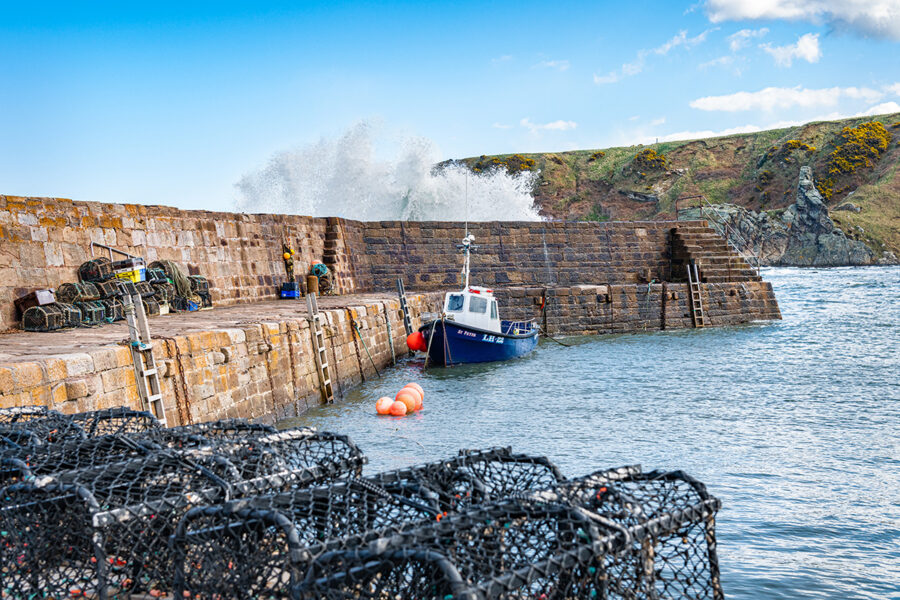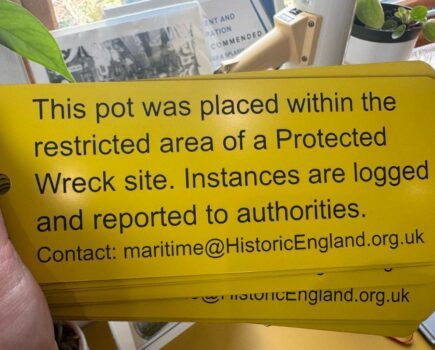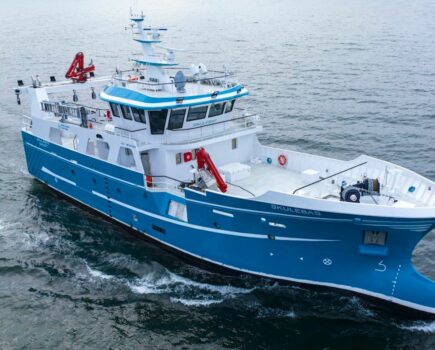Representatives from the fisheries and seafood sectors took part in a session on the EU-UK co-operation agreement in the Scottish Parliament recently, joining stakeholders from the wider food and farming sectors in a roundtable session of the Rural Affairs and Islands Committee on Wednesday, 18 June.
While the first part of the session focused on the proposed sanitary and phytosanitary (SPS) agreement with the EU, it ended with a closer look at fisheries issues, including quota share and access agreements.
On the UK Government’s EU ‘reset’ deal, Elspeth Macdonald, chief executive of the Scottish Fishermen’s Federation, said that ‘the EU insisted on there being a deal on access to waters nailed down and finalised before they would get to the common understanding position of even having an agreement to have a discussion about an agreement on SPS’, and that the cost of moving toward the new SPS agreement – the UK ‘giving up control of access to our waters for a staggering period of time’ – was too high for the UK fisheries sector.
She noted that ‘the agreement on access for fisheries was devastatingly bad for our sector and far worse than we had anticipated.’ While the conditions in the existing Trade and Co-operation Agreement would have meant having ‘one of our hands tied behind our back’, she argued it would have allowed for annual negotiations, some degree of control of EU access to UK waters and ‘the potential ability to leverage a fairer share of the fishing opportunity in our waters’.
Asked to outline the practical effects of the agreement running to 2038, Elspeth Macdonald said that ‘we are now locked in to a very dysfunctional agreement with the EU for another 12 years that will limit the ability of our fleet to make use of the latent catching capacity that it has, and will limit the amount of raw material going into processors’.
Taken together with other pressures such as ‘spatial exclusions from large areas of the sea for reasons of conservation or for expansion of offshore wind energy’, she said this ‘makes it hard for our sector to see significant opportunity for growth in the short to medium term’.
Asked about the impact on the deal on the processing sector, Jimmy Buchan, chief executive of the Scottish Seafood Association, said he had fears around the willingness of businesses to continue to ‘invest in a future that has now been put on hold for a 12-year period’ and which ‘means the opportunity of more raw material coming to our shores from our own fleet will be restricted’.
He added that processing businesses would respond by looking to ‘add value’ to that fish that is being landed in Scotland ‘so that our communities can thrive and therefore that money feeds back into the fishing community so that we can keep them at sea until such times of a possible reset’.
On dealing with the UK Government, Elspeth Macdonald said that there had been lots of engagement with Defra and UK fisheries minister Daniel Zeichner, but that there was a feeling of ‘lack of attention from the secretary of state [Steve Reed] on fisheries matters’.
Adam Wing, head of trade marketing for the UK, Middle East and Asia at Seafood Scotland, added that while engagement with Defra was ‘relatively good’, it does ‘feel like their hands are tied by the centre’ and seems that ‘they don’t really have much of a say of what goes on within their own brief ’.
Asked by committee convenor Finlay Carson (Conservative) to consider if the negative outcomes for fishing in the deal could be blamed on ‘a breakdown in communication’, Elspeth Macdonald said
that there was ‘certainly no reason by which any of the key departments in the UK Government would have felt that they didn’t know what our position was’.
She highlighted that ‘some of the feedback that I did get from Steve Reed was that our position had been consistent and had been very clear and had been heard, but it’s one thing being heard, it’s another thing action being taken on what you hear’.
Asked by Evelyn Tweed (SNP) if quota is being fully utilised or if there are fleet sectors that could be developed, Elspeth Macdonald responded that there will be fisheries that could be developed but that there are ‘regulatory barriers’. She noted that it would be important that ‘the Scottish Government’s fisheries policy landscape allows there to be that exploration and sensible development of opportunities for new fisheries’ and to avoid ‘bureaucracy and regulation that is disabling rather than enabling’.
Beatrice Wishart (Liberal Democrat) asked if there might be any potential benefits from the deal, such as EU vessels landing more catch into Scotland. Elspeth Macdonald responded that the Scottish industry doesn’t have much sense of, or control over, whether the EU fleet would change how they operate.
She referred to earlier comments by Jimmy Buchan that when fish was landed into Scotland by overseas vessels it was often then taken to the EU for processing. Jimmy Buchan added that he would ‘like to see some sort of encouragement for raw material to come through our ports’ and that it would be ‘even better if the fish was being processed here’, which would allow the sector to grow.
Jimmy Buchan noted the struggles across the entire food processing sector to get people to work in the industry, which made Scotland ‘uncompetitive in a European and global market’, and said that an arrangement on ‘free movement of labour would have been an added bonus’ in the deal.
SPS deal: a silver lining for seafood exports?
In the earlier part of the session on wider trade issues, David Thomson, chief executive of the Food and Drink Federation Scotland, said that an SPS deal ‘is likely to reduce bureaucracy, reduce costs and reduce paperwork’ for food manufacturers, but noted that the proposed agreement goes much further than just an SPS deal, and not knowing the detail or how dynamic alignment would be dealt is currently causing concerns.
Elspeth Macdonald also saw ‘some risks’ on these issues around ‘the extent of potential dynamic alignment and how far back the chain will it go’, raising concerns that it could cut across work on Fisheries Management Plans or attempt to ‘suck the UK back into the confines of the Common Fisheries Policy’.
Jimmy Buchan noted that, in the context of the agreement, ‘we’re all thinking it’s going to be a reset back to where we were’ prior to Brexit, but he suspected that ‘we will get more frictionless, but I don’t think it will be free of friction’.
Adam Wing noted that the ‘impossible’ costs for smaller businesses in exporting and issues around groupage had led to many businesses ceasing to trade with the EU in the last few years, with some moving to other markets and others going out of business altogether.
In answer to a question from Mark Ruskell (Green) on the proposed Rosyth to Dunkirk ferry and if an SPS agreement could reduce the need for border control posts (BCPs), Jimmy Buchan noted that he had ‘always been a great advocate of us having a direct route into the EU from Scotland’ as ‘chokes or civil disruption at BCPs’ cause particular problems ‘given Scotland so depends on live or fresh seafood getting to market on day one for day-two delivery or day-three delivery’.
The opportunities that might be presented by automation were also raised, with Jimmy Buchan noting the ‘huge variations’ between the larger industrialised businesses dealing with volume who could potentially benefit, and the smaller artisan businesses where the investment needs to be into people and their skills to drive the businesses.
Jimmy Buchan said that the cost of labour and other taxes on business mean that seafood processing struggles to be a ‘profitable supply chain industry’. However, the live seafood market would be ‘a clear winner’ if the eventual SPS agreement can reduce checks and ‘speed up the process through the BCPs and into wider Europe’.
This story was taken from the latest issue of Fishing News. For more up-to-date and in-depth reports on the UK and Irish commercial fishing sector, subscribe to Fishing News here or buy the latest single issue for just £3.50 here.
Sign up to Fishing News’ FREE e-newsletter here.








